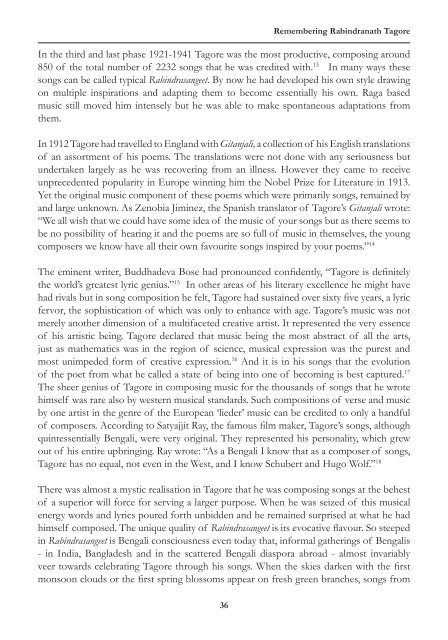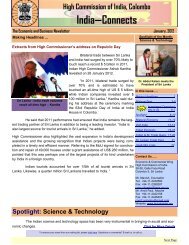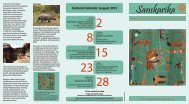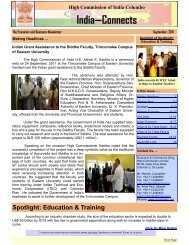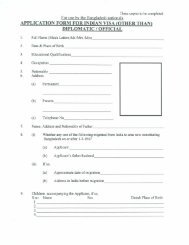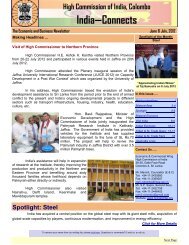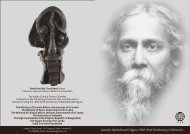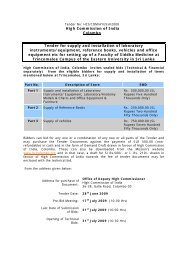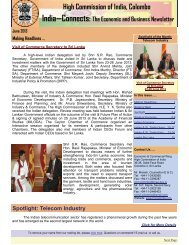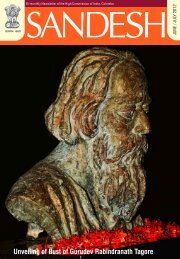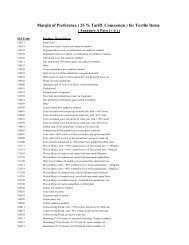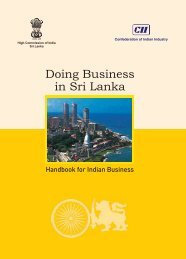Remembering Rabindranath Tagore Volume - High Commission of ...
Remembering Rabindranath Tagore Volume - High Commission of ...
Remembering Rabindranath Tagore Volume - High Commission of ...
You also want an ePaper? Increase the reach of your titles
YUMPU automatically turns print PDFs into web optimized ePapers that Google loves.
36<br />
<strong>Remembering</strong> <strong>Rabindranath</strong> <strong>Tagore</strong><br />
In the third and last phase 1921-1941 <strong>Tagore</strong> was the most productive, composing around<br />
850 <strong>of</strong> the total number <strong>of</strong> 2232 songs that he was credited with. 13 In many ways these<br />
songs can be called typical Rabindrasangeet. By now he had developed his own style drawing<br />
on multiple inspirations and adapting them to become essentially his own. Raga based<br />
music still moved him intensely but he was able to make spontaneous adaptations from<br />
them.<br />
In 1912 <strong>Tagore</strong> had travelled to England with Gitanjali, a collection <strong>of</strong> his English translations<br />
<strong>of</strong> an assortment <strong>of</strong> his poems. The translations were not done with any seriousness but<br />
undertaken largely as he was recovering from an illness. However they came to receive<br />
unprecedented popularity in Europe winning him the Nobel Prize for Literature in 1913.<br />
Yet the original music component <strong>of</strong> these poems which were primarily songs, remained by<br />
and large unknown. As Zenobia Jiminez, the Spanish translator <strong>of</strong> <strong>Tagore</strong>’s Gitanjali wrote:<br />
“We all wish that we could have some idea <strong>of</strong> the music <strong>of</strong> your songs but as there seems to<br />
be no possibility <strong>of</strong> hearing it and the poems are so full <strong>of</strong> music in themselves, the young<br />
composers we know have all their own favourite songs inspired by your poems.” 14<br />
The eminent writer, Buddhadeva Bose had pronounced confidently, “<strong>Tagore</strong> is definitely<br />
the world’s greatest lyric genius.” 15 In other areas <strong>of</strong> his literary excellence he might have<br />
had rivals but in song composition he felt, <strong>Tagore</strong> had sustained over sixty five years, a lyric<br />
fervor, the sophistication <strong>of</strong> which was only to enhance with age. <strong>Tagore</strong>’s music was not<br />
merely another dimension <strong>of</strong> a multifaceted creative artist. It represented the very essence<br />
<strong>of</strong> his artistic being. <strong>Tagore</strong> declared that music being the most abstract <strong>of</strong> all the arts,<br />
just as mathematics was in the region <strong>of</strong> science, musical expression was the purest and<br />
most unimpeded form <strong>of</strong> creative expression. 16 And it is in his songs that the evolution<br />
<strong>of</strong> the poet from what he called a state <strong>of</strong> being into one <strong>of</strong> becoming is best captured. 17<br />
The sheer genius <strong>of</strong> <strong>Tagore</strong> in composing music for the thousands <strong>of</strong> songs that he wrote<br />
himself was rare also by western musical standards. Such compositions <strong>of</strong> verse and music<br />
by one artist in the genre <strong>of</strong> the European ‘lieder’ music can be credited to only a handful<br />
<strong>of</strong> composers. According to Satyajjit Ray, the famous film maker, <strong>Tagore</strong>’s songs, although<br />
quintessentially Bengali, were very original. They represented his personality, which grew<br />
out <strong>of</strong> his entire upbringing. Ray wrote: “As a Bengali I know that as a composer <strong>of</strong> songs,<br />
<strong>Tagore</strong> has no equal, not even in the West, and I know Schubert and Hugo Wolf.” 18<br />
There was almost a mystic realisation in <strong>Tagore</strong> that he was composing songs at the behest<br />
<strong>of</strong> a superior will force for serving a larger purpose. When he was seized <strong>of</strong> this musical<br />
energy words and lyrics poured forth unbidden and he remained surprised at what he had<br />
himself composed. The unique quality <strong>of</strong> Rabindrasangeet is its evocative flavour. So steeped<br />
in Rabindrasangeet is Bengali consciousness even today that, informal gatherings <strong>of</strong> Bengalis<br />
- in India, Bangladesh and in the scattered Bengali diaspora abroad - almost invariably<br />
veer towards celebrating <strong>Tagore</strong> through his songs. When the skies darken with the first<br />
monsoon clouds or the first spring blossoms appear on fresh green branches, songs from


